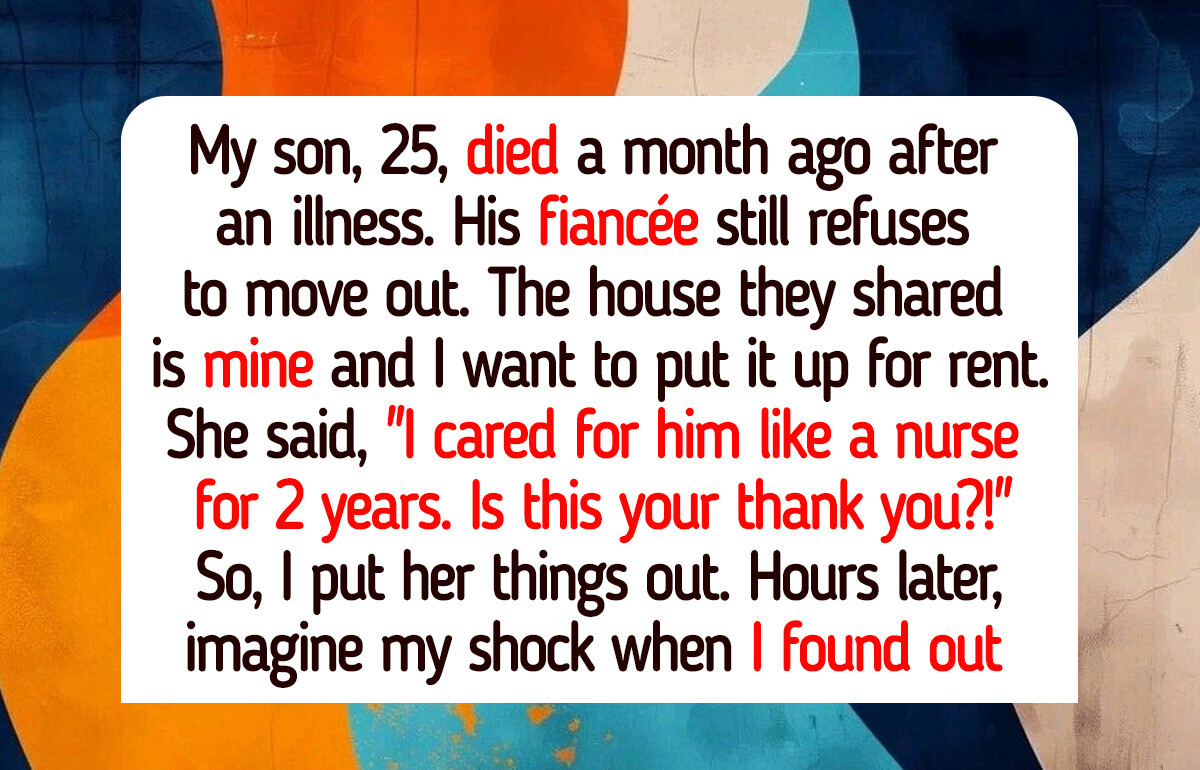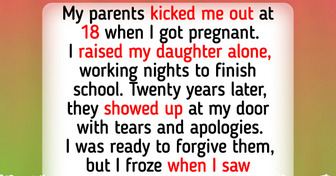Sorry for your loss, remember you are majorly shareholder. You hold all the cards.
I Refused to Keep My Late Son’s Fiancée in His House—We’re Not a Charity

Losing a loved one often brings unexpected challenges, especially when family, property, and money are involved. Emotions can run high, and decisions made during grief can spark even more conflict. Recently, one of our readers sent us a letter about facing this exact situation with her late son’s fiancée.
Helena’s letter:
Dear Bright Side,
My son, 27, passed away a month ago after an illness. His fiancée still refuses to move out.
The house they shared is mine, and I want to rent it out. She said, “I cared for him like a nurse for two years. Is this your thank you?!” So, I was left with no choice but to put her things out.
Hours later, imagine my shock when I found out that my son had left her his shares in the business we own. Her lawyer called to inform me that 20% of the business now belongs to her.
My son never mentioned this to me, but it seems that in his final days, as his health was declining, he signed the papers to make it official.
Now, I am legally obligated to see her every single day and share our profits with her.
This woman was my son’s fiancée, not even his wife. They didn’t even have any kids.
I really don’t want her to be “glued” to our family forever now that he’s gone. This feels very unfair.
Do you have any advice for me on how I can handle this situation?
Yours,
Helena
Thank you for sharing your story, Helena.
What you’re facing isn’t just grief, but also the shock of realizing your son made decisions that permanently tied his fiancée to your life and business. This is a deeply emotional and complicated situation, so here is our advice to you.
Separate Your Grief From the Business Reality.

I am glad she wasn't married to your son because you aren't mother in law material. You sound more like a money hungry brat that anything. She can pay you rent reduced of course because she obviously took care of your son in his dying days. Stop being so greedy. You sound much like a narcissist than a mother. She rightfully owns part of your company. Again, stop being greedy ..
Your anger at her presence is tied to the pain of losing your son, but the business arrangement is a legal fact.
Action: Consider hiring a professional manager or intermediary to handle communication with her about the business. This gives you breathing room so that your grief doesn’t get tangled into every meeting.
Redefine the House as a Fresh Start for Both.
The house has become a painful symbol of conflict — for you, it’s your property; for her, it’s where she lost the man she loved.
Action: Instead of pushing her out abruptly, consider offering her time-limited access (a few months) or helping her transition into her own space. This way, you draw a clear line without appearing as though you’re erasing your son’s memory.
Use the Business Share as an Opening, Not a Burden.
You see her 20% as an unwanted tie, but it could also be the bridge to something new.
Action: If she’s willing, assign her a role that aligns with her strengths (marketing, client relations, or administration). By channeling her into a productive role, you transform the partnership from “forced” to potentially beneficial.
Create a Separate Space to Process Your Grief.
The anger you feel toward her may partly be displaced grief over your son’s sudden death.
Action: Join a grief support group or speak with a counselor specifically about the overlap of loss and family conflict. By processing your emotions elsewhere, you can return to the business table calmer and less likely to see her only as an intruder.
Here’s another story that sparked plenty of discussion. Kristin has been cooking for her husband’s family every Sunday, but she’s finally had enough. He insists on hosting them since they helped buy the house. Here’s what happened next.
Comments
Sorry for your loss. This feels somewhat vindictive. She's your son's fiance. You don't have to like her.
Maybe, showing her some compassion, as your both grieving, giving her time to say good bye to the life she had, and prepare for another life, without him..
Instead of kicking her out, why don't you offer to rent the house to your sons fiancee? That makes more sense to me than fighting each other over the house.
I'm sorry for your loss but you sound very heartless. She was his fiancée, still grieving and instead of trying to morally support each other you want to kick her outside to become homeless? You could've offered a few months to decide to either rent the house herself or find a new place. I feel horrible for the fiancée. compassion is a thing...
Depending on how long they lived together she may ne his common law wife.and her son probaly knew the minute he died she would boot his fiance, the person he loved out. So she may have some rights no one thought of and mom may get a surprise she doesnt like
When your son signed his part of the business over to his fiancee was he declared in his right mind? Since your son was so sick I would think the lawyer would need a medical signature stating so.
My daughter, her fiancee and their 3 girls rented a home i owned. The fiancee couldnt keep a job and he always talked down to me and my daughter. He was always talking about how smart he was but everyone did him wrong.
They complained about how bad things were and ask if I would not charge them till they got all the bills caught up. OK, ill help by doing that but I cant do this for very long.
Well 2yrs later they v were still not paying. I was paying for my home and their's. Tax for both homes and any fines they received (trash piles in the yard, burning trash after given hours, grass over a foot high, abandoned vehicle, etc...) were adding up.
I personally ask them to leave. My daughter said she understood and would tell him. I heard nothing.
So, I typed a request to vacate. Gave them 3 months to find a place and go. I still hear nothing and 4 mths later they are still there.
I look out my window in-between waiting on them to move and I see police cars next door ( that's where they were ) Well of course I go to see what's happened. As I walk up I ask the officer what going on. His response was, " Who are You? " As I look towards the front door I see my daughter. As I get closer she starts to turn around. When she looks at me my heart sank and tears filled my eyes and ran down my face as I gasp for air. She had 2 TWO BLACK Eyes. This man beat her and the 2 daughters they had then warched.
Next step I make is legal. I go to the court house pay, and wait for the notice to come in the mail. Just for your information if you give them and email address that's where all your notices will go. I missed the court date and didn't even know it.
So, I go back and file again. This time I took my email off. Guess what I got tgw notice in the mail. LOL!
This hearing i show up and the first thing the judge ask was have I tried to communicate w the Tennants. Yes Sir I have and he ask me to prove it.
I had my 1st letter with the date given.
2nd letter with same info.
1st eviction and my apologies for missing it.
And then the 3rd notice that we were working on that day.
He listened to her, ask her why they had not taken care of the problem. Their logic is a totally different conversation.
He looked at her and told her I had given her over 6mths to move or make this right and she had done nothing. He said I give
Related Reads
14 Times Kindness Was the Plot Twist No One Saw Coming

10 Real Stories of How Small Acts of Kindness Changed People Forever

18 Stories That Prove Living in an Apartment Is Like Having a Front-Row Seat to a Comedy Show

I Turned Down a Promotion and Got Fired—My Revenge Was Brutal

10 Times a Moment of Pure Cruelty Was Actually a Secret Act of Kindness

15 Stories That Prove Some Memories Are Impossible to Delete

My Parents Abandoned Me at 18, Now They’re Begging for My Forgiveness

I Refused to Turn Our Romantic Trip Into a Family Vacation and Faced the Consequence

My Parents Refused to Fund My Education, So I Turned the Tables on Them

My Parents Wanted a ‘Family Vacation’ on My Budget—I Made One Move They Didn’t Expect

I Refuse to Earn Pennies While My Manager Cashes a Fortune

I Refuse to Let My Daughter Attend Her Dad’s Wedding




